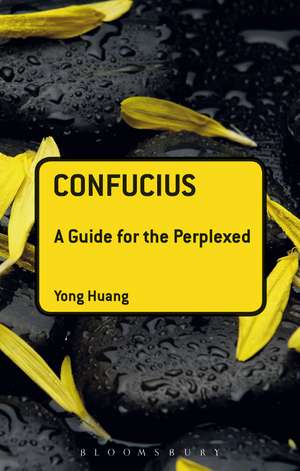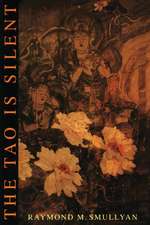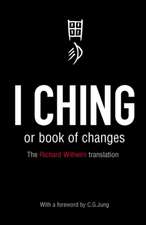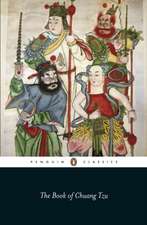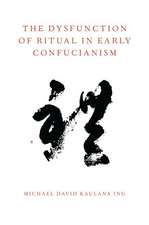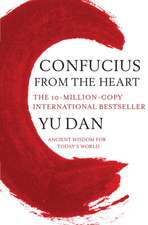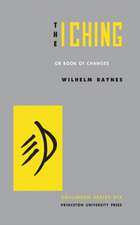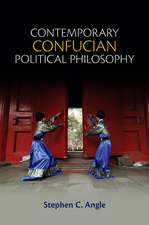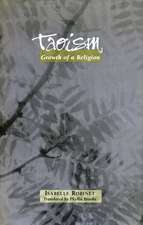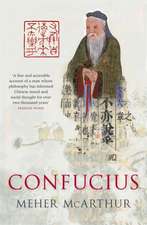Confucius: A Guide for the Perplexed: Guides for the Perplexed
Autor Prof. Yong Huangen Limba Engleză Hardback – 20 noi 2012
Din seria Guides for the Perplexed
- 14%
 Preț: 164.68 lei
Preț: 164.68 lei - 14%
 Preț: 163.34 lei
Preț: 163.34 lei - 14%
 Preț: 179.10 lei
Preț: 179.10 lei -
 Preț: 145.10 lei
Preț: 145.10 lei - 14%
 Preț: 133.15 lei
Preț: 133.15 lei -
 Preț: 166.82 lei
Preț: 166.82 lei - 14%
 Preț: 170.50 lei
Preț: 170.50 lei - 24%
 Preț: 150.50 lei
Preț: 150.50 lei - 8%
 Preț: 145.90 lei
Preț: 145.90 lei -
 Preț: 178.12 lei
Preț: 178.12 lei - 15%
 Preț: 163.01 lei
Preț: 163.01 lei - 14%
 Preț: 165.03 lei
Preț: 165.03 lei - 8%
 Preț: 157.75 lei
Preț: 157.75 lei - 14%
 Preț: 164.93 lei
Preț: 164.93 lei - 14%
 Preț: 164.76 lei
Preț: 164.76 lei - 22%
 Preț: 164.31 lei
Preț: 164.31 lei - 9%
 Preț: 156.88 lei
Preț: 156.88 lei - 15%
 Preț: 162.99 lei
Preț: 162.99 lei - 22%
 Preț: 565.55 lei
Preț: 565.55 lei - 13%
 Preț: 256.49 lei
Preț: 256.49 lei - 14%
 Preț: 163.87 lei
Preț: 163.87 lei - 19%
 Preț: 158.90 lei
Preț: 158.90 lei - 19%
 Preț: 170.25 lei
Preț: 170.25 lei - 22%
 Preț: 595.65 lei
Preț: 595.65 lei -
 Preț: 215.33 lei
Preț: 215.33 lei - 22%
 Preț: 712.64 lei
Preț: 712.64 lei - 14%
 Preț: 164.13 lei
Preț: 164.13 lei - 14%
 Preț: 164.76 lei
Preț: 164.76 lei - 14%
 Preț: 145.10 lei
Preț: 145.10 lei - 14%
 Preț: 144.83 lei
Preț: 144.83 lei - 22%
 Preț: 595.32 lei
Preț: 595.32 lei - 20%
 Preț: 190.50 lei
Preț: 190.50 lei - 14%
 Preț: 176.25 lei
Preț: 176.25 lei - 14%
 Preț: 163.08 lei
Preț: 163.08 lei - 22%
 Preț: 567.17 lei
Preț: 567.17 lei - 20%
 Preț: 177.77 lei
Preț: 177.77 lei - 22%
 Preț: 770.86 lei
Preț: 770.86 lei - 14%
 Preț: 163.96 lei
Preț: 163.96 lei - 22%
 Preț: 946.89 lei
Preț: 946.89 lei - 14%
 Preț: 145.01 lei
Preț: 145.01 lei - 20%
 Preț: 176.25 lei
Preț: 176.25 lei - 14%
 Preț: 595.17 lei
Preț: 595.17 lei
Preț: 596.00 lei
Preț vechi: 763.52 lei
-22% Nou
Puncte Express: 894
Preț estimativ în valută:
114.06€ • 117.83$ • 94.93£
114.06€ • 117.83$ • 94.93£
Carte tipărită la comandă
Livrare economică 26 martie-09 aprilie
Preluare comenzi: 021 569.72.76
Specificații
ISBN-13: 9781441115683
ISBN-10: 1441115684
Pagini: 192
Dimensiuni: 138 x 216 x 18 mm
Greutate: 0.39 kg
Editura: Bloomsbury Publishing
Colecția Bloomsbury Academic
Seria Guides for the Perplexed
Locul publicării:London, United Kingdom
ISBN-10: 1441115684
Pagini: 192
Dimensiuni: 138 x 216 x 18 mm
Greutate: 0.39 kg
Editura: Bloomsbury Publishing
Colecția Bloomsbury Academic
Seria Guides for the Perplexed
Locul publicării:London, United Kingdom
Caracteristici
Author is well established within comparative philosophy and, thus, will provide an account of Confucius from the perspective of Chinese-Western philosophies.
Notă biografică
Yong Huang is Professor of Philosophy at Kutztown University, USA, and Visiting Zijiang Chair Professor of Philosophy at East China Normal University, China; he is also Editor of Dao: A Journal of Comparative Philosophy.
Cuprins
1. The Life of Confucius: "A Homeless Dog" 2. Morality: Why You Should Not Turn the Other Cheek 3. Virtue: How to Love Virtue as You Love Sex 4. Moral Education: How to Teach What Can Only be Learned by Oneself 5. Filial Piety: Why an Upright Son Does Not Disclose His Father Stealing a SheepNotes References Index
Recenzii
'A fair and thoughtful overview of Confucius's philosophy by a scholar who has worked with the relevant texts for many years. A particular strength of the book is the author's sensitivity to current problems in philosophy, especially ethics; through sympathetic reading and argumentation, Huang shows that Confucian ideas are as relevant today as in the past.'
'Yong Huang's book is a wonderful, lively introduction to Confucianism. Huang addresses basic questions about Confucius and his views, but his treatment of them invites much more than basic understanding, discussing both Confucius and the tradition of interpreting him with rich complexity and sophistication. Huang does not shrink from deep scholarly issues but addresses them in a way both beginners and scholars will appreciate, providing a range of interpretive views in a remarkably accessible and engaging way.'
This is the best historical and philosophical introduction to Confucius for today's readers. Clearly written, Confucius' ethical teaching is vividly presented in dialogue with the Chinese exegetic tradition and western philosophers, both classical and modern. This is a must-read.
The Analects is a text that perplexes even the most sophisticated reader. While no one will exhaust the creative puzzlement of the Analects, Huang's work goes a long way to show why perplexity can foster genuine moral reflection and action.
Yong Huang's Confucius: A Guide for the Perplexed is a unique introduction to early Confucian thought from the perspective of comparative analytic philosophy . . . Huang makes liberal use of both Confucian commentators and modern philosophers-Chinese and Western. It is really a tour de force of comparative philosophy.
Amid a sea of translations and introductions aimed at the novice or nonspecialist reader, Huang's short topical survey of key themes in the Confucian Analects stands out as an island of elegance, concision, and erudition.
'Yong Huang's book is a wonderful, lively introduction to Confucianism. Huang addresses basic questions about Confucius and his views, but his treatment of them invites much more than basic understanding, discussing both Confucius and the tradition of interpreting him with rich complexity and sophistication. Huang does not shrink from deep scholarly issues but addresses them in a way both beginners and scholars will appreciate, providing a range of interpretive views in a remarkably accessible and engaging way.'
This is the best historical and philosophical introduction to Confucius for today's readers. Clearly written, Confucius' ethical teaching is vividly presented in dialogue with the Chinese exegetic tradition and western philosophers, both classical and modern. This is a must-read.
The Analects is a text that perplexes even the most sophisticated reader. While no one will exhaust the creative puzzlement of the Analects, Huang's work goes a long way to show why perplexity can foster genuine moral reflection and action.
Yong Huang's Confucius: A Guide for the Perplexed is a unique introduction to early Confucian thought from the perspective of comparative analytic philosophy . . . Huang makes liberal use of both Confucian commentators and modern philosophers-Chinese and Western. It is really a tour de force of comparative philosophy.
Amid a sea of translations and introductions aimed at the novice or nonspecialist reader, Huang's short topical survey of key themes in the Confucian Analects stands out as an island of elegance, concision, and erudition.
